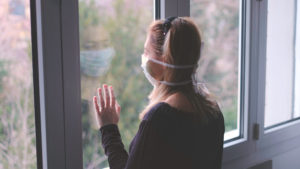 So, you’re staying inside and isolated to protect yourself from COVID-19. And while you’re reducing your risk for contracting the virus, you could be boosting the risk for other illnesses.
So, you’re staying inside and isolated to protect yourself from COVID-19. And while you’re reducing your risk for contracting the virus, you could be boosting the risk for other illnesses.
Self-isolation is a trade-off. Staying in and limiting contact with others for the foreseeable future can offer self-protection, protection for loved ones, and for society at large. But it also leaves you vulnerable to loneliness.
Advertisement
Humans are social creatures, after all.
Loneliness can affect your memory, heart health, and more. A recent report from the National Academies of Sciences, Engineering, And Medicine suggests that social isolation is linked to a 50% increased risk for dementia, 29% higher risk for heart disease, and 32% higher stroke risk.
There is even data to suggest that loneliness’s influence on longevity could be equivalent to smoking 15 cigarettes per day. It may even exceed the risks associated with obesity, heavy drinking, and sedentary living.
When all that is considered, social isolation may protect you from COVID 19, but it can also leave you susceptible to other health risks. So, how can you self-isolate and practice responsible citizenry without getting lonely?
Quite simply, call your friends. Don’t text or email them. Use the phone so they can hear your voice, and they yours, so you can make a personal connection. Video calling or conferencing among friends and social groups helps you feel connected and protects against the health risks of loneliness.
When chatting with friends, even if it’s for as little as five minutes, try to fully engage. Avoid trying to multitask, and just sit down for a good attentive chat. That way, all the parties involved will get more out of it.
Advertisement
Another way to reduce the impact of loneliness is to do something productive. If you know your neighbor down the street might be lonely or has a hard time moving around, find out how you can help. Leaving a note in their mailbox saying to give you call can be a big help.
Aside from helping them, it can also make your community a stronger place to live. Doing things that make you feel good—or bring value to the world around you—are two of the best ways avoid loneliness and limit the health risks of social isolation.
Deciding to handle self-isolation in a way that protects your memory, heart, and more, can allow you to overcome the health risks of loneliness.
